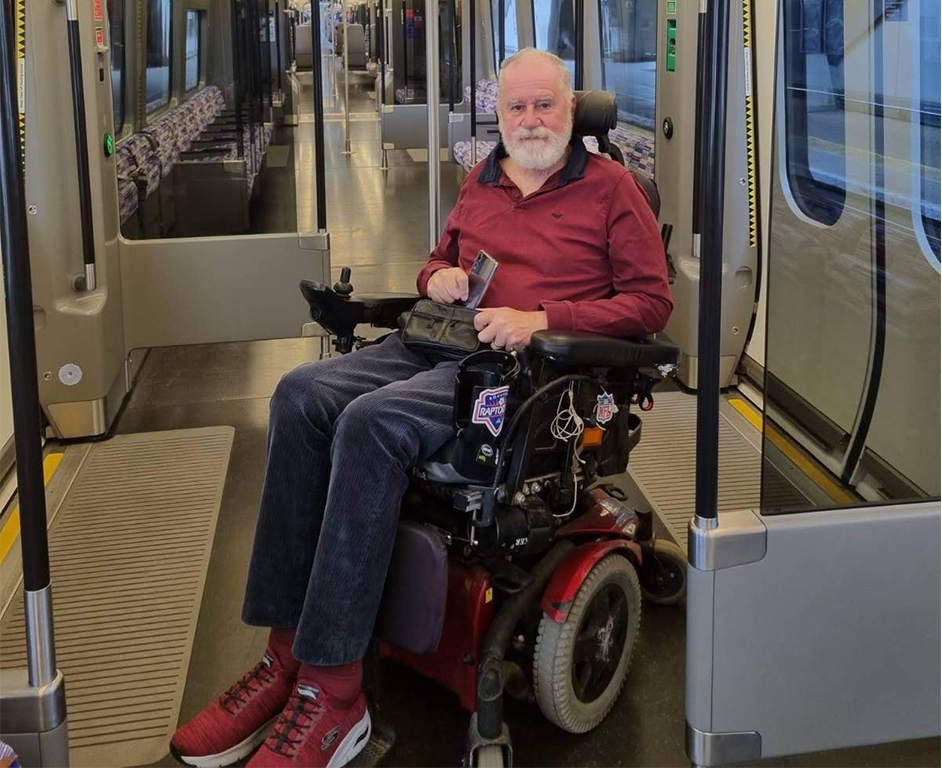MND symptoms progress over time and can affect mobility and movement.
This impacts on how you do things and get around. You may find it useful to find out how to get support.
Select from the following options or search for content by need with our:
Care information finder
“You need to be as well informed as possible about how to access services.”
How do I get my mobility and movement needs assessed?
Adult social services can provide a needs assessment if you have MND, or a carer's assessment if you are providing support. Your assessment works out your needs, including for mobility and movement. This explores which support services could assist and helps you plan for emergencies too.
If your mobility and movement are affected, make sure you raise awareness of this during your assessment. Some external support may be necessary, as care needs will increase with MND. To arrange an assessment of your needs, contact your local authority in England and Wales, or your local health and social care trust in Northern Ireland. For details, see information sheet 10B - What is social care?
Benefits and financial support
You may also be entitled to a range of benefits and financial support. When making a claim or being assessed, always provide lots of detail about how long things take and any help needed to complete tasks. This is more likely to result in more appropriate support.
Find out more on our page about Benefits, financial support and cost of living.
Contact our Benefits Advice Service for personal guidance.
Further information
We provide information to help or look on www.gov.uk for England and Wales, or www.nidirect.gov.uk for Northern Ireland.
You may find our page on Getting the right treatment or care with MND helpful. This explains how the NICE guideline on motor neurone disease can help.
For more information, see:
How do I find out about equipment and wheelchairs?
Lots of equipment and aids can help with mobility and movement. These are designed to assist with all sorts of physical tasks, including getting around, dressing, washing, and eating and drinking. For example, grab rails or walking aids can help with mobility. In time, you may also want information about wheelchairs.
Who can help me with equipment or wheelchairs?
Always ask your occupational therapist for guidance before buying equipment, as they can assess existing and possible future needs. Not all products suit everyone and it can be frustrating and costly if an item arrives that doesn’t help.
“We have a good occupational therapist and physiotherapist who organise the equipment required, and a good palliative care team who look after our needs.”
We can provide support to access equipment from adult social care services or the NHS (statutory services). We also provide certain items on loan or MND support grants where statutory services cannot supply or have waiting lists. For more details about our support, see Our services.
For more detail, see information sheet 11C – Equipment and wheelchairs.
When do I need to think about home adaptations and installations?
Adapting your home can take time if your mobility and movement are affected. You may need assistance with funding, which can also be a lengthy process. Investigate this as soon as possible if you think it may be necessary.
“Find out about the things you need and plan ahead, so things are in place when needed.”
What do I need to think about for mobility and movement?
Try to think about your future needs when looking at adapting your environment or adding major installations. Seek an assessment with an occupational therapist (OT) who can help assess how well your home supports your needs.
For example, a stairlift can be helpful for mobility and movement around your home. However, if you use a wheelchair, you may need two with a stairlift – one for the ground floor to transfer onto the stairlift seat, and another upstairs to transfer back out of the stairlift seat and move onwards. Hoists can also help transfers to different rooms, or locations such as chair to bed.
Other choices may help, such as a through floor lift or downstairs room conversion for ease of access. There may be funding to assist with major installations.
See also our page on Needs assessment, home care and home adaptations and information sheet 10C – Disabled Facilities Grants and home accessibility.
Can transport, travel and holidays be made easier for me?
When mobility and movement are affected with MND, travelling becomes more challenging. There are ways to make this easier.
Planning well ahead gives you time to find accessible accommodation and transport to meet your needs. Find out what is on offer, and give service providers plenty of notice if special arrangements need to be made.
“Ensure services and providers understand how MND affects you.”
We offer resources to help you with this.
See our booklet Getting around for general guidance about transport.
See information sheet 8D – Air travel and ventilation for motor neurone disease.
We cannot endorse particular providers, but if you are worried about finding travel insurance with MND, our MND Connect helpline can discuss your needs and give basic guidance.
Can I still drive or use a vehicle?
By law, you must inform the DVLA if you are diagnosed with MND. This does not mean you have to stop driving, but you may need to take a medical or driving assessment.
Your driving needs will be more complex if your mobility and movement have been affected. Expert advice can help you continue driving safely for as long as possible, or travel more comfortably as a passenger.
“The Motability car has given Dad a new lease of life and so much freedom, so the benefits really do outweigh the costs.”
Carer, supporting a person with MND
For more information see our booklet Getting around.
Page last updated: 18 February 2025
Next full review: February 2027
